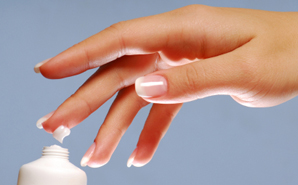
Image: © iStockphoto.com
If your hands are sore, split, chapped or even bleeding from the constant hand-washing that is a necessary part of a nurse’s life, don’t despair that you’ll never have soft hands again. That’s because a wide array of products and practical tips can help salvage even the roughest hands.
The key is that just as you’ve developed the habit of constantly washing your hands, you can also make it a continual practice to provide a little hand TLC.
To help restore your dry and sore hands:
1. Cover up. Be extra vigilant to protect your hands from the elements—and that means gloves or mittens whenever you’re outside during the cold weather, even if only for a few minutes.
2. Change your technique. When washing your hands, use warm or cold water, never hot. Ask for approval to use a gentler hand soap, such as Cetaphil, Aveeno or Dove. Avoid hand soaps that have alcohol, which can not only be drying and irritating, but can sting your raw skin. When drying your hands, blot, don’t rub. If possible, use cotton towels, not paper towels, which can be irritating to the skin and even cause some allergic reactions.
3. Use the glove treatment. For many nurses, latex gloves or those containing powder can be a real irritant to chapped or split skin. One option is to slip on thin cotton gloves, which can be found in drug stores, before putting on latex gloves.
4. Moisturize, moisturize, moisturize. Lightweight lotions don’t cut it for most nurses, since the constant hand-washing takes a much greater toll on the skin. That’s why any moisturizing product should have a thick consistency—you should be able to put a dollop on your hand, and when you turn your hand over, it won’t budge. Some good options: Cetaphil Moisturizing Cream, Aquaphor Healing Ointment, Eucerin Plus, Bag Balm and Neutrogena Norwegian Formula Hand Cream. The key is using lotion often—each time you wash your hands, if possible. Buy the travel sizes to keep at your desk or in your pocket. A note of caution: Check with infection control before adopting this practice, as some lotions can affect the integrity of gloves and may even cause tears.
5. Protect split skin. While it can sting when applying, using a liquid bandage product such as one by Band-Aid can keep your hands from bleeding and prevent a split from getting worse. Remember, an open wound can get infected.
6. Practice good habits at home. Use your off hours to be extra kind to your hands. Wash with a gentle soap such as those mentioned above, and always wear gloves when using any cleaning product. Slather on a good moisturizer right before bed, then don cotton gloves or cotton socks so the moisture can deeply penetrate the skin overnight.
Finally, if your hands continue to get worse, see a dermatologist. You may need treatment that you can’t get over the counter.



